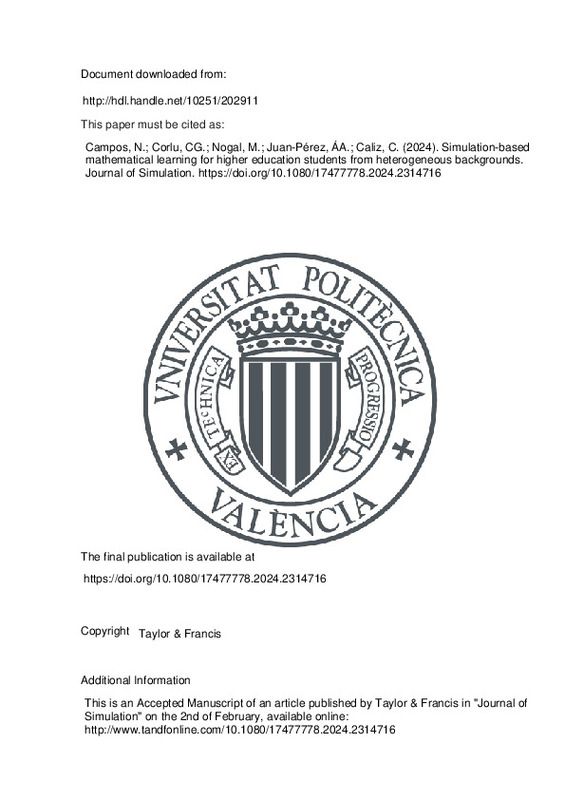JavaScript is disabled for your browser. Some features of this site may not work without it.
Buscar en RiuNet
Listar
Mi cuenta
Estadísticas
Ayuda RiuNet
Admin. UPV
Simulation-based mathematical learning for higher education students from heterogeneous backgrounds
Mostrar el registro sencillo del ítem
Ficheros en el ítem
| dc.contributor.author | Campos, Neila
|
es_ES |
| dc.contributor.author | Corlu, Canan G.
|
es_ES |
| dc.contributor.author | Nogal, María
|
es_ES |
| dc.contributor.author | Juan, Angel A.
|
es_ES |
| dc.contributor.author | Caliz, Cristina
|
es_ES |
| dc.date.accessioned | 2024-03-04T19:02:18Z | |
| dc.date.available | 2024-03-04T19:02:18Z | |
| dc.date.issued | 2024-02 | es_ES |
| dc.identifier.issn | 1747-7778 | es_ES |
| dc.identifier.uri | http://hdl.handle.net/10251/202911 | |
| dc.description | This is an Accepted Manuscript of an article published by Taylor & Francis in "Journal of Simulation" on the 2nd of February, available online: http://www.tandfonline.com/10.1080/17477778.2024.2314716 | es_ES |
| dc.description.abstract | [EN] This paper explores the use of simulation-based training for mathematical learning in undergraduate and graduate mathematics, science, and engineering courses. Simulation-based training offers the advantages of active learning and inquiry-based learning techniques. Furthermore, it provides extensive flexibility, ranging from user-level usage of simulations to the modification or creation of new possibilities by the student, thus engaging different cognitive levels to achieve the learning objectives. This is particularly interesting in groups consisting of students from diverse backgrounds and levels, due to factors such as their international origin or varying prior education, especially in interdisciplinary Master's degree programmes. Additionally, in online or blended environments (which have become widespread during the last years), simulation-based learning has the advantage of granting students a certain degree of autonomy, which can, to some extent, compensate for the absence of the instructor's physical presence. | es_ES |
| dc.language | Inglés | es_ES |
| dc.publisher | Taylor & Francis | es_ES |
| dc.relation.ispartof | Journal of Simulation | es_ES |
| dc.rights | Reconocimiento - No comercial (by-nc) | es_ES |
| dc.subject | Higher education | es_ES |
| dc.subject | Mathematical e-learning | es_ES |
| dc.subject | Simulation-based education | es_ES |
| dc.subject | Cognitive levels | es_ES |
| dc.subject | Online education | es_ES |
| dc.subject.classification | ESTADISTICA E INVESTIGACION OPERATIVA | es_ES |
| dc.title | Simulation-based mathematical learning for higher education students from heterogeneous backgrounds | es_ES |
| dc.type | Artículo | es_ES |
| dc.identifier.doi | 10.1080/17477778.2024.2314716 | es_ES |
| dc.rights.accessRights | Abierto | es_ES |
| dc.contributor.affiliation | Universitat Politècnica de València. Escuela Politécnica Superior de Alcoy - Escola Politècnica Superior d'Alcoi | es_ES |
| dc.description.bibliographicCitation | Campos, N.; Corlu, CG.; Nogal, M.; Juan, AA.; Caliz, C. (2024). Simulation-based mathematical learning for higher education students from heterogeneous backgrounds. Journal of Simulation. https://doi.org/10.1080/17477778.2024.2314716 | es_ES |
| dc.description.accrualMethod | S | es_ES |
| dc.relation.publisherversion | https://doi.org/10.1080/17477778.2024.2314716 | es_ES |
| dc.type.version | info:eu-repo/semantics/publishedVersion | es_ES |
| dc.relation.pasarela | S\510014 | es_ES |







![[Cerrado]](/themes/UPV/images/candado.png)

